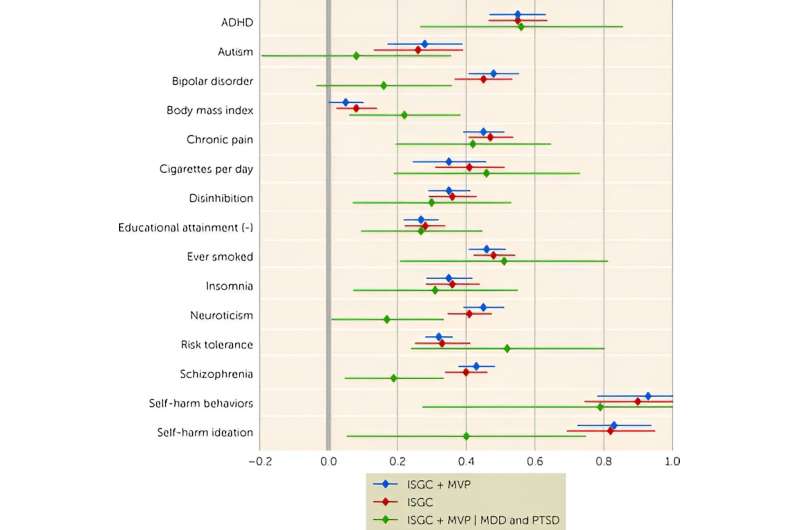This article has been reviewed according to Science X's editorial process and policies. Editors have highlighted the following attributes while ensuring the content's credibility:
fact-checked
peer-reviewed publication
trusted source
proofread
Largest-ever genetic study of suicide finds new risk factors

The reasons why people attempt suicide are complex and include external triggers like trauma and stress, as well as inherited genetic factors. A new study published online on October 1 in the American Journal of Psychiatry has identified 12 DNA variants, or variations in the human genetic code, that are associated with risk of attempting suicide.
The research highlights strong genetic links between suicide attempt and factors that influence physical and behavioral health—including impulsivity, smoking, chronic pain, ADHD, pulmonary conditions, and heart disease. These findings suggest that some of the genetic underpinnings of suicide are shared with these conditions.
One day, this information could lead to a better understanding of biological causes of suicide and improvements in prevention strategies. Eventually, such advances could help health care providers identify people who may need mental health support.
"Many people who die from suicide have significant health conditions associated with that risk," says Anna Docherty, Ph.D., the study's corresponding author and associate professor of psychiatry at Huntsman Mental Health Institute at the University of Utah. "If we can use genetic information to characterize the health risks of those who attempt suicide, we can better identify those patients who need contact with the mental health care system."
Scientists at HMHI, Icahn School of Medicine at Mount Sinai, Duke University School of Medicine, Durham Veterans Affairs Health Care System, and Vanderbilt University Medical Center led the collaboration with multiple institutions worldwide. They analyzed data from 22 different populations across the globe, including people of diverse ancestral and ethnic backgrounds.
Understanding genetic risk of suicide
No single gene causes suicide. Rather, the cumulative effect of many different genes influences a person's risk. "In psychiatry, we have many tiny genetic effects, but when we account for all of them together, we start to see a real genetic risk signal," Docherty explains.
To tease out such a diffuse signal, researchers applied statistical methods to data collected from a large number of people and identified genetic variations that are more common among individuals who have attempted suicide.
The new analysis combines data from the Million Veteran Program (MVP) and the International Suicide Genetics Consortium (ISGC). Together, these include 43,871 documented suicide attempts and 915,025 ancestry-matched controls, making this the largest genetic study of suicide to date.
A meta-analysis of the studies identified new genetic variants that correlated with suicide attempt. The researchers then compared all variant signals with previously published genetic data on more than 1,000 other traits and disorders, including psychiatric conditions (e.g., ADHD), physical conditions (e.g., heart disease), and behaviors (e.g., smoking), and determined that genetic variants linked to suicide attempt are also linked to other health conditions.
"That allowed us to look at how genetic risk for suicide overlaps with genetic risk for depression, heart disease, and many other risk factors," Docherty says. "It showed significant overlap with mental health conditions, but also a lot of physical health conditions, particularly for smoking and lung-related illnesses. This is something we can't necessarily see in medical records of people who die from suicide."
The results do not mean that people with any one of these health factors are at high risk for attempting suicide, notes Hillary Coon, Ph.D., study co-author and professor of psychiatry at HMHI. Rather, combining the genetic predisposition with other stressors—which could include other genetic risk factors, health conditions, life circumstances, or traumatic events—could increase that risk, she explains.
Initial analyses support the idea that many of the DNA variants that the scientists identified are located in genes with known biological functions, bolstering the case that changes in these genes could affect a person's physiology or behavior. Several of the genes control processes in cells such as managing cellular stress, repairing damaged DNA, and communicating with the immune system. Most are also highly expressed in the brain and are known targets of antipsychotic and antidepressant drugs.
Scientists will need to carry out additional studies to determine whether the variants directly or indirectly impact suicide risk, and how. The research so far has shown an association and not cause and effect.
Understanding how suicide is linked to other health conditions could open doors to new ways of assessing—and treating—suicide risk, Docherty adds. "We want to start to explore the biological underpinnings that are common across suicide and these health factors, because that will lead to the most convincing drug targets," she says.
More information: Anna R. Docherty et al, GWAS Meta-Analysis of Suicide Attempt: Identification of 12 Genome-Wide Significant Loci and Implication of Genetic Risks for Specific Health Factors, American Journal of Psychiatry (2023). DOI: 10.1176/appi.ajp.21121266


















